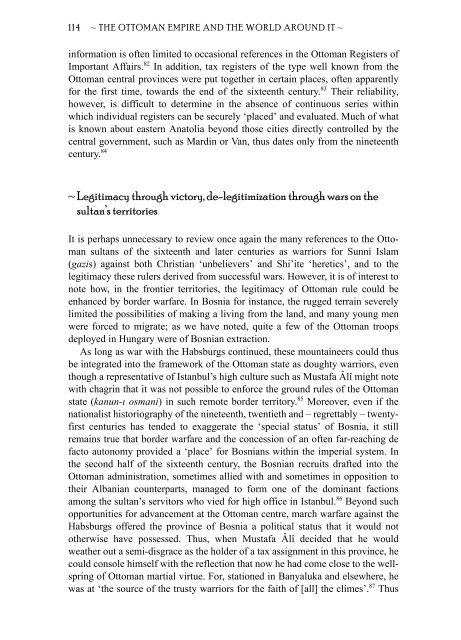The Ottoman Empire and the World Around It - Course Information
The Ottoman Empire and the World Around It - Course Information
The Ottoman Empire and the World Around It - Course Information
You also want an ePaper? Increase the reach of your titles
YUMPU automatically turns print PDFs into web optimized ePapers that Google loves.
114 ~ THE OTTOMAN EMPIRE AND THE WORLD AROUND IT ~<br />
information is often limited to occasional references in <strong>the</strong> <strong>Ottoman</strong> Registers of<br />
Important Affairs. 82 In addition, tax registers of <strong>the</strong> type well known from <strong>the</strong><br />
<strong>Ottoman</strong> central provinces were put toge<strong>the</strong>r in certain places, often apparently<br />
for <strong>the</strong> first time, towards <strong>the</strong> end of <strong>the</strong> sixteenth century. 83 <strong>The</strong>ir reliability,<br />
however, is difficult to determine in <strong>the</strong> absence of continuous series within<br />
which individual registers can be securely ‘placed’ <strong>and</strong> evaluated. Much of what<br />
is known about eastern Anatolia beyond those cities directly controlled by <strong>the</strong><br />
central government, such as Mardin or Van, thus dates only from <strong>the</strong> nineteenth<br />
century. 84<br />
~ Legitimacy through victory, de-legitimization through wars on <strong>the</strong><br />
sultan’s territories<br />
<strong>It</strong> is perhaps unnecessary to review once again <strong>the</strong> many references to <strong>the</strong> <strong>Ottoman</strong><br />
sultans of <strong>the</strong> sixteenth <strong>and</strong> later centuries as warriors for Sunni Islam<br />
(gazis) against both Christian ‘unbelievers’ <strong>and</strong> Shi’ite ‘heretics’, <strong>and</strong> to <strong>the</strong><br />
legitimacy <strong>the</strong>se rulers derived from successful wars. However, it is of interest to<br />
note how, in <strong>the</strong> frontier territories, <strong>the</strong> legitimacy of <strong>Ottoman</strong> rule could be<br />
enhanced by border warfare. In Bosnia for instance, <strong>the</strong> rugged terrain severely<br />
limited <strong>the</strong> possibilities of making a living from <strong>the</strong> l<strong>and</strong>, <strong>and</strong> many young men<br />
were forced to migrate; as we have noted, quite a few of <strong>the</strong> <strong>Ottoman</strong> troops<br />
deployed in Hungary were of Bosnian extraction.<br />
As long as war with <strong>the</strong> Habsburgs continued, <strong>the</strong>se mountaineers could thus<br />
be integrated into <strong>the</strong> framework of <strong>the</strong> <strong>Ottoman</strong> state as doughty warriors, even<br />
though a representative of Istanbul’s high culture such as Mustafa Âlî might note<br />
with chagrin that it was not possible to enforce <strong>the</strong> ground rules of <strong>the</strong> <strong>Ottoman</strong><br />
state (kanun-ı osmani) in such remote border territory. 85 Moreover, even if <strong>the</strong><br />
nationalist historiography of <strong>the</strong> nineteenth, twentieth <strong>and</strong> – regrettably – twentyfirst<br />
centuries has tended to exaggerate <strong>the</strong> ‘special status’ of Bosnia, it still<br />
remains true that border warfare <strong>and</strong> <strong>the</strong> concession of an often far-reaching de<br />
facto autonomy provided a ‘place’ for Bosnians within <strong>the</strong> imperial system. In<br />
<strong>the</strong> second half of <strong>the</strong> sixteenth century, <strong>the</strong> Bosnian recruits drafted into <strong>the</strong><br />
<strong>Ottoman</strong> administration, sometimes allied with <strong>and</strong> sometimes in opposition to<br />
<strong>the</strong>ir Albanian counterparts, managed to form one of <strong>the</strong> dominant factions<br />
among <strong>the</strong> sultan’s servitors who vied for high office in Istanbul. 86 Beyond such<br />
opportunities for advancement at <strong>the</strong> <strong>Ottoman</strong> centre, march warfare against <strong>the</strong><br />
Habsburgs offered <strong>the</strong> province of Bosnia a political status that it would not<br />
o<strong>the</strong>rwise have possessed. Thus, when Mustafa Âlî decided that he would<br />
wea<strong>the</strong>r out a semi-disgrace as <strong>the</strong> holder of a tax assignment in this province, he<br />
could console himself with <strong>the</strong> reflection that now he had come close to <strong>the</strong> wellspring<br />
of <strong>Ottoman</strong> martial virtue. For, stationed in Banyaluka <strong>and</strong> elsewhere, he<br />
was at ‘<strong>the</strong> source of <strong>the</strong> trusty warriors for <strong>the</strong> faith of [all] <strong>the</strong> climes’. 87 Thus


